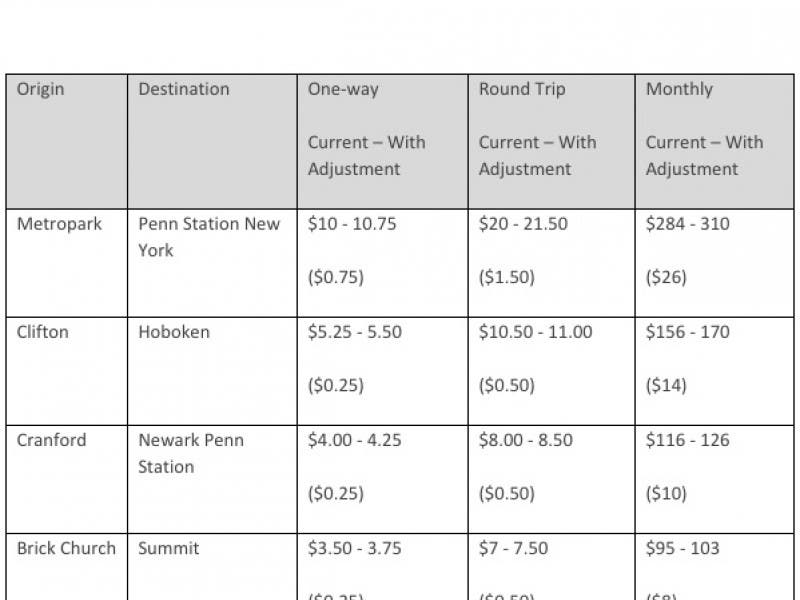Politics & Government
9 Percent Fare Hikes For NJ Transit Rail, Bus Users In New Jersey
Several lawmakers slammed the hikes that will cost some users as much as $26 more a month to ride the rails to New York City.

NJ Transit rail and bus users will pay an average 9 percent increase in fares under a $2.1 billion operating budget that supports continued investments in infrastructure, the agency said.
Under the budget, no customer will pay more than 9.4 percent for services that will include some changes, with ratepayers spending as much as $26 more a month to ride the rails to New York City (see accompanying photos).
The agency’s Board of Directors adopted a $2.116 billion operating budget and a $2.099 billion capital program for the fiscal year that started July 1, 2015.
Find out what's happening in Oaklandwith free, real-time updates from Patch.
“NJ Transit is moving forward with a balanced budget that reflects a laser-like look at individual business lines in order to maximize efficiencies and maintain a safe transportation system,” NJ Transit Executive Director Veronique “Ronnie” Hakim, said. “As transit professionals, we owed our customers and stakeholders a good-faith effort to present them a solid plan that had the least impact on our riders. After much hard work, I am confident we delivered on that.”
Assembly Majority Leader Louis Greenwald chided New Jersey Transit’s decision Wednesday to hike fares once again on “hardworking New Jerseyans:”
Find out what's happening in Oaklandwith free, real-time updates from Patch.
“This is a serious blow to working families who are still absorbing the near record hikes instituted five years ago. Not only are they having more money taken out of their pockets, but the agency is adding insult to injury by cutting services.”
Senate Majority Leader Loretta Weinberg issued the following statement on the decision by NJ Transit to cut services and hike fares on commuters by 9 percent on average. The senator testified before the board of directors during the hearing process in opposition to the fare increase:
“For many residents, NJ Transit is the only way to get to and from work or school or to access healthcare. Increasing fares is not equitable. It is not sustainable. And it is not the answer. Fare increases disproportionately affect low-income residents, who are more likely to rely on public transportation as their primary mode of transport. The increase also represents a larger portion of their income.”
Nearly half of the revenue in the FY 2016 operating budget comes from fares ($1.005 billion), supported by a comparable amount from state and federal program reimbursements ($961.8 million) with the balance from a combination of commercial revenues ($115.2 million) and state operating assistance ($33.2 million).
The capital program funds continued state-of-good-repair investments in transit stations and infrastructure supports an ongoing fleet modernization program and advances service reliability, safety and technology initiatives.
Operating Budget
The FY 2016 operating budget reflects an increase of state funding along with a stable level of federal and other reimbursements, which will enable NJ TRANSIT to meet the agency’s projected expenses this fiscal year. Approximately 59 percent of the operating budget is dedicated to labor and fringe benefits costs. Other significant expenses include contracted transportation services, fuel and power and materials, which together comprise approximately 27 percent of the operating budget.
This year’s operating budget reflects a $76.7 million (8.3 percent) growth in passenger revenue, based on the fare adjustment and ridership trends. Overall passenger revenue and commercial revenue represents approximately 53 percent of the total FY 2016 operating program.
Capital Program
The FY 2016 capital program continues to prioritize investment in infrastructure to maintain an overall state of good repair, enhance safety and reliability, and improve the overall customer experience on the system.
The program continues to invest in upgrades to the Northeast Corridor (NEC),
the agency’s most utilized rail line. The NEC is allocated $61 million in FY 2016 as part of NJ TRANSIT’s ten-year, $1 billion Northeast Corridor investment program.
Highlights of the program include $82 million in rail station improvements: $27 million for Summit Station improvements, $14 million for Elizabeth Station enhancements, $6 million for Perth Amboy Station improvements and high-level platform construction, $4 million for Newark Penn Station upgrades, $4 million to reconstruct Lyndhurst Station to make it accessible to persons with disabilities and $2 million for New Brunswick Station improvements.
The program also supports continued investment in rolling stock renewal, with $87 million invested in rail rolling stock improvements and $40 million toward the purchase of new buses.
In addition, the program is undertaking approximately $913 million in major capital projects that will help advance NJ Transit’s resiliency to extreme weather events.
Funding is also provided for technology and security upgrades, local programs, and rail, bus and light rail infrastructure improvements.
Approximately 42 percent of the capital budget comes from the Federal Transit Administration (FTA) Sandy Resiliency funds, with the balance coming from federal and other sources including 22% from the Transportation Trust Fund (TTF).
The service adjustments, which will take effect September 1st, are as follows:
RAIL:
· Pascack Valley Line:
Elimination of Train #1601, the 12:45 a.m. departure from Hoboken
· Montclair-Boonton Line:
Elimination of Train #1043, the 1:35 a.m. departure from Montclair State University
BUS:
· 419 Camden – Pennsauken – Burlington:
Elimination of Service Between Riverside and Burlington City
· 463 Woodbury – Avandale Park-Ride:
Elimination of the Last PM Trip in Each direction
· 307 Freehold – Great Adventure
Service Discontinuance
· 318 Philadelphia – Great Adventure:
Service Discontinuance
· 655 Princeton – Plainsboro:
Service Discontinuance
· 872 Morristown – Route 10 – Livingston:
Elimination of Service Between Mack-Cali (Parsippany) and Livingston Mall
Get more local news delivered straight to your inbox. Sign up for free Patch newsletters and alerts.